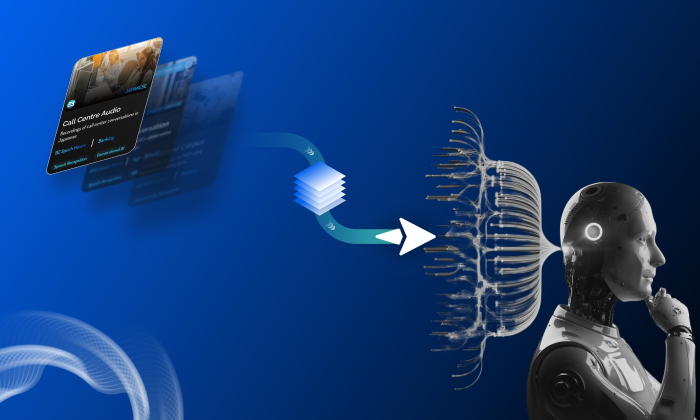How can I choose the right AI data partner for my specific project?
Data Management
Project Strategy
AI Integration
Choosing the right AI data partner is a pivotal decision that can significantly influence the success of your AI project. With a multitude of options available, it's crucial to evaluate potential partners based on factors that align with your specific needs, project goals, and ethical considerations. Here's how you can make an informed choice:
Understanding Your Project Needs
- Define Your Objectives: Start by clearly outlining your project objectives. Are you working on a speech recognition system, a natural language processing application, or a multimodal AI model? Each of these requires different types of data, such as audio, text, or visual datasets. Knowing your goals helps you zero in on partners who specialize in the required modalities.
- Assess Data Requirements: Once your objectives are set, identify specific data needs:
- Data Types: Consider whether you need labeled audio, text, images, or a combination.
- Volume of Data: Determine the expected data volume necessary for training and evaluation.
- Quality Standards: Define critical quality metrics such as accuracy, completeness, and consistency.
Criteria for Evaluating AI Data Partners
- Proven Domain Expertise for Tailored Solutions: Select partners with a track record in your industry. Such expertise can lead to higher-quality data and more relevant insights. For instance, a partner experienced in speech AI will understand transcription nuances better than a generalist.
- Robust Infrastructure and Capabilities: Ensure the AI data partner has the infrastructure to support:
- Scalability: Can they handle large-scale projects and adjust to changing needs?
- Speed: Are they capable of delivering data quickly without sacrificing quality?
- Quality Assurance: Look for a multi-layered QA framework to maintain high standards.
Ethical Considerations and Compliance
1.Data Governance and Compliance Standards
Compliance with data protection regulations like GDPR and CCPA is essential. Ensure your partner has:
- Transparent Consent Processes: Verify their methods for obtaining informed consent from contributors.
- Clear Data Provenance: Look for thorough documentation of data sourcing and participant demographics.
2.Strategies for Fairness and Bias Mitigation
An effective data partner should actively minimize bias. Evaluate their practices for ensuring demographic diversity and representative samples. This is crucial for developing AI systems that are inclusive and perform well across diverse user backgrounds.
Importance of Collaboration and Iteration
1.Transparent Communication and Reporting
Choose a partner that prioritizes transparency throughout the project lifecycle. This includes:
- Regular Updates: Expect timely reports on progress, quality metrics, and challenges.
- Client-Accessible Dashboards: These enhance collaboration by allowing you to track data in real-time.
2.Responsive Support and Iterative Feedback
Assess the partner's responsiveness to inquiries. Effective communication fosters a strong relationship and ensures that project adjustments or issues are promptly addressed. A collaborative feedback loop can significantly enhance project outcomes.
Typical Challenges When Choosing an AI Data Partner
- Avoiding Overly Optimistic Promises: Be wary of partners who make unrealistic claims about data readiness or pricing. Ensure that commitments are backed by documented capabilities.
- Ensuring Clarity in Deliverables: Avoid partners who cannot provide a detailed outline of expected data quality, quantity, and compliance documentation. This clarity is crucial to avoid misunderstandings and unmet expectations.
Real-World Impacts & Use Cases
Consider examples like a speech recognition project requiring diverse accent coverage or a vision AI project needing varied lighting conditions. A partner like FutureBeeAI with a global contributor network and a robust platform like Yugo, can efficiently meet these needs by providing tailored, high-quality datasets.
Conclusion
Choosing the right AI data partner involves a thoughtful evaluation of your project requirements, ethical standards, and the partner’s capabilities. By focusing on domain expertise, infrastructure, ethical practices, and communication strategies, you can select a partner that aligns with your goals. FutureBeeAI, with its comprehensive approach to data sourcing and management, stands ready to support you in building robust AI systems. For projects demanding diverse and high-quality data, consider FutureBeeAI as your strategic partner to drive successful outcomes.
FAQs
Q. What types of data can I expect from an AI data partner?
A. AI data partners typically provide various data types, including audio recordings, text datasets, images, and multimodal combinations, tailored to your project's needs.
Q. How can I ensure the quality of the data provided?
A. Inquire about the partner's quality assurance processes, including validation methods, error-checking protocols, and the accuracy of annotation and transcription services.
What Else Do People Ask?
Related AI Articles
Browse Matching Datasets
Acquiring high-quality AI datasets has never been easier!!!
Get in touch with our AI data expert now!








